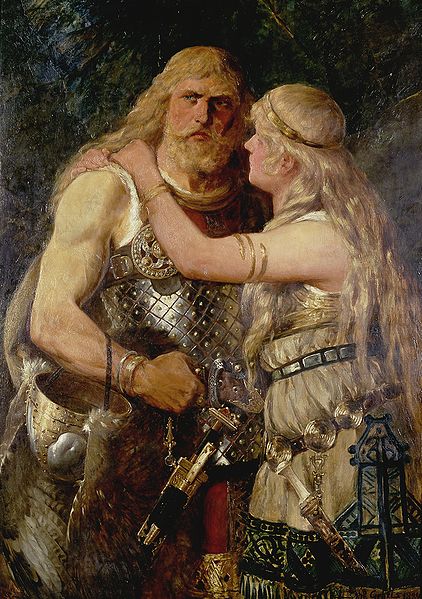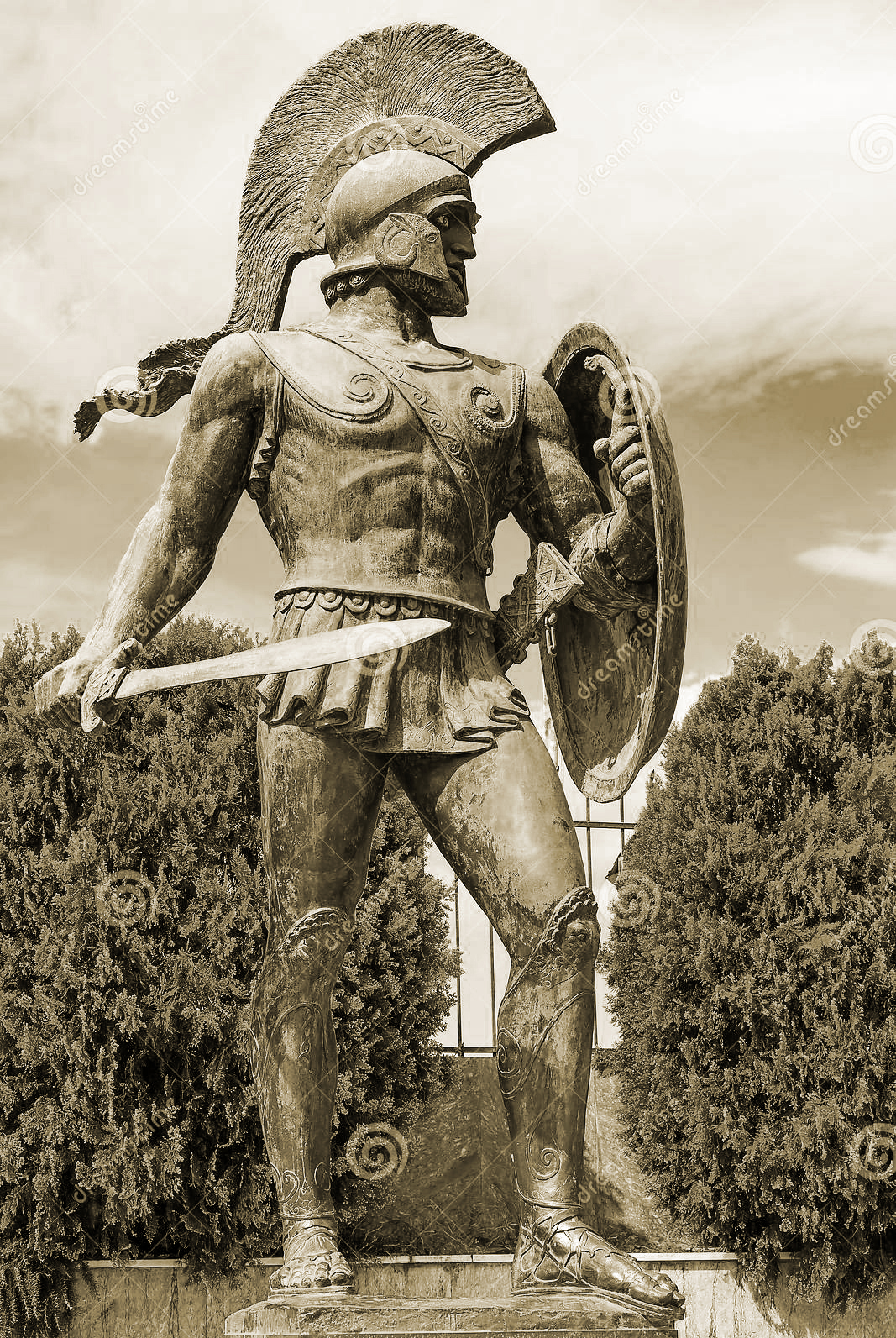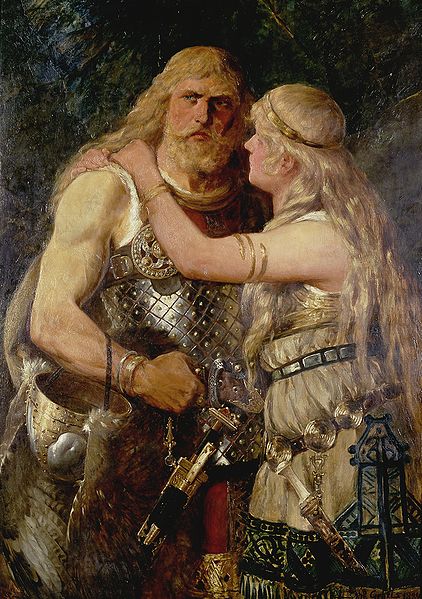The following is my abridgement of chapter 16 of William Pierce’s history of the white race, Who We Are:
Death Struggle Between Germany and Rome
Decided Fate of White Race
Hermann Was Savior of Europe & White Race

Julius Caesar’s conquest of all the Celts and Germans west of the Rhine and his punitive raids into the German lands on the other side of the river bought time for the Romans to concentrate their military efforts against the still independent Celts inhabiting the Swiss and Austrian Alps and the lowlands between the Alps and the Danube, from Lake Constance to Vienna. More than three decades of intermittent warfare by Caesar and his successors finally subdued these Celts, and their lands became the Roman provinces of Rhaetia, Noricum, and Pannonia.
Germania Magna. By 15 B.C. the Danube had been established as the dividing line between the Roman Empire and the free German lands to the north—or Germania Magna, as the Romans named this territory bounded on the west, the south, and the east by the Rhine, the Danube, and the Vistula, respectively. The conquered German lands west of the Rhine, in Alsace, Luxembourg, Belgium, and the southern Netherlands, were divided into the Roman provinces of Upper and Lower Germany.
In 12 B.C. Emperor Augustus sent his stepson Drusus, who had played a major role in the subjection of the Celts, to the mouth of the Rhine to launch an invasion of Germania Magna. Although initially unsuccessful, Drusus led repeated campaigns against the Germans, and by 9 B.C. had defeated several tribes, most notably the Chatti, and pushed more than 200 miles into Germania Magna, reaching the Elbe.
Tribal Names. At this point an aside on the names of the German tribes may be helpful; otherwise we may easily become confused by the proliferation of often-conflicting designations given to the various tribes and groupings of tribes by the Romans, the Germans, and others. Because the ancient Germans were, for most practical purposes, illiterate (the Germans’ runes were used for inscriptions but not for writing books), the earliest German tribal names we have are those recorded by the Romans: Batavi, Belgae, Chatti, Chauci, Cherusci, Cimbri, Eburones, Frisii, Gothones, Hermunduri, Langobardi, Marcomanni, Saxones, Suevi, Teutones, etc. It is assumed that in most cases these were reasonable approximations to the actual German names.
In some cases these tribal names assigned by the Romans of Caesar’s time have survived in the names of modern nations or provinces: Belgium, Saxony, Lombardy, Gotland, and so on. More often they have not; the great stirring up of the nations of Europe between the latter part of the second century and the middle of the sixth century A.D.—the Voelkerwanderung, or wandering of the peoples—profoundly changed the German tribal groupings. Some tribes vanished without a trace; others reappeared as elements in new tribal configurations which combined many of the older tribes.
Thus, the Saxons of the eighth century consisted not only of the Saxones known to the Romans, but of many other tribal elements as well. The Franks likewise arose after Caesar’s time as a confederation of many German tribes.
The Romans referred to all the German tribes collectively as Germani, but this was apparently originally the name of only a single minor tribe, which later lost its independent existence. In similar manner the Romanized Franks of a later day referred to all their German neighbors by the name of a single tribal grouping which arose during the Voelkerwanderung, the Alamanni; the French name for any German is still allemand.
Conquests. Over the next dozen years the Roman military machine continued to consolidate and expand its conquests in Germania Magna. Most of the independent tribes left were those east of the Elbe. Some, like the Marcomanni, had been forced to leave their ancestral lands in the west and resettle east of the Elbe in order to avoid defeat by the Romans. The Germans were on the defensive everywhere, and they seemed well on the way to suffering the collective fate of the Celts.
They were finally beginning to learn one vital lesson, however: they must either unite in the face of the common enemy or become extinct; the independence of the various tribes was a luxury they could no longer afford. A king of the Marcomanni, Marbod, succeeded in uniting most of the tribes east of the Elbe and organizing a standing draft army of 70,000 infantry and 4,000 cavalry from among them, the first time the Germans had accomplished such a feat.
The imperial representative in the conquered German lands was Publius Quintilius Varus, who was more a lawyer and a politician than a general. As an administrator he was brutal, arbitrary, and rapacious. Overturning all local customs, contemptuous of German tradition and sensibility, Varus applied the same measures against the tribes of Germania Magna which he had used earlier while he was proconsul in the Middle East and which Caesar had employed successfully to break the spirit of the Celts in Gaul. He succeeded instead in transforming the respect Germans had learned for Roman power into a bitter and implacable hatred.
The 19th-century English historian Edward Creasy describes especially well the German reaction to Varus and his army:
Accustomed to govern the depraved and debased natives of Syria, a country where courage in man and virtue in woman had for centuries been unknown, Varus thought that he might gratify his licentious and rapacious passions with equal impunity among the high-minded sons and pure-spirited daughters of Germany. When the general of any army sets the example of outrages of this description, he is soon faithfully imitated by his officers and surpassed by his still more brutal soldiery. The Romans now habitually indulged in those violations of the sanctity of the domestic shrine and those insults upon honor and modesty by which far less gallant spirits than those of our Teutonic ancestors have often been maddened into insurrection.
Hermann the Cheruscer. As the latter-day Romans were shortly to learn, the Germans dared a great deal. There came to the fore among the wretched, conquered tribes a German leader cast in the mold of the Celt Vercingetorix. Unlike the case with the latter, however, this new leader’s daring brought success. He was Hermann, son of Segimar, king of the Cherusci. The Romans called him Arminius. In Creasy’s words:
It was part of the subtle policy of Rome to confer rank and privileges on the youth of the leading families in the nations which she wished to enslave. Among other young German chieftains Arminius and his brother, who were the heads of the noblest house in the tribe of the Cherusci, had been selected as fit objects for the exercise of this insidious system. Roman refinements and dignities succeeded in denationalizing the brother, who assumed the Roman name of Flavius and adhered to Rome throughout all her wars against his country. Arminius remained unbought by honors or wealth, uncorrupted by refinement or luxury. He aspired to and obtained from Roman enmity a higher title than ever could have been given him by Roman favor.
Shortly before 1 A.D. Hermann went to Rome to learn the Roman ways and language. He was 17 or 18 years old. He served five years in a Roman legion and became a Roman citizen, a member of the equites, or knightly class. He was sent by Augustus to aid in the suppression of the rebellion in Pannonia and Dalmatia.
What Hermann learned about the Romans redoubled his hatred of them. Again, Creasy’s words on the subject can hardly be bettered:
Vast, however, and admirably organized as the fabric of Roman power appeared on the frontiers and in the provinces, there was rottenness at the core. In Rome’s unceasing hostilities with foreign foes and still more in her long series of desolating civil wars, the free middle classes of Italy had almost wholly disappeared. Above the position which they had occupied an oligarchy of wealth had reared itself; beneath that position a degraded mass of poverty and misery was fermenting. Slaves, the chance sweepings of every conquered country, shoals of Africans, Sardinians, Asiatics, Illyrians, and others, made up the bulk of the population of the Italian peninsula. The foulest profligacy of manners was general in all ranks….
With bitter indignation must the German chieftain have beheld all this and contrasted it with the rough worth of his own countrymen: their bravery, their fidelity to their word, their manly independence of spirit, their love of their national free institutions, and their loathing of every pollution and meanness. Above all he must have thought of the domestic virtues which hallowed a German home; of the respect there shown to the female character and of the pure affection by which that respect was repaid. His soul must have burned within him at the contemplation of such a race yielding to these debased Italians.
When he returned to his people at the age of 25, Hermann was given a Roman command under Varus. He immediately set to work organizing a revolution. The most difficult obstacle he had to overcome was neither the Germans’ lack of military stores or even a single walled fortress, nor their traditional disunity; it was the opposition from the conservative faction among his own people.
As is always so with conservatives, they preferred immediate prosperity under Roman rule, through the trade opportunities it offered or through advantages bestowed on individual leaders by the Romans, to freedom, honor, and the long-range preservation and promotion of their own stock. One of the most hostile of these Romanized conservatives was Hermann’s own father-in-law. Nevertheless, Hermann prevailed over the conservative opposition and won most of the leaders of the Cherusci and the neighboring tribes to his conspiracy.
In the summer of 9 A.D. Varus’ army, consisting of five legions, was encamped among the Saxons, west of the Weser in the modern state of North Rhine-Westphalia. Late in the month of September Hermann contrived to have a localized rebellion break out among some tribes to the east, and messengers soon arrived at Varus’ camp with news of the insurrection. Varus immediately set out with three of his legions to crush the revolt, giving Hermann the task of gathering up the Romans’ German auxiliary forces and following him.
Hermann sprang his carefully planned trap. Instead of gathering an auxiliary force to support Varus, he sent his agents speeding the revolutionary call to the tribes, far and near.
Hermann then set out in pursuit of Varus, catching up with him amid the wild ravines, steep ridges, and tangled undergrowth of the Teutoburger Forest, about 20 miles west of the Weser, near the present town of Detmold. The progress of the Roman army had been severely hampered by the heavy autumn rains and the marshy condition of the ground, and Hermann fell on Varus’ legions with a suddenness and fury which sent the Romans reeling.
For nearly three days the battle raged with a ferocity which exacted a heavy toll from both sides. The Germans employed guerrilla tactics, suddenly attacking the floundering Roman columns from an unexpected quarter and then withdrawing into the dense forest before the Romans could group themselves into effective fighting formation, only to attack again from a different quarter.
On the third day of battle the exhausted remnants of Varus’ army panicked and broke, and the Germans annihilated them. Once more, we will let Creasy tell the story:
The Roman officer who commanded the cavalry, Numonius Vala, rode off with his squadrons in the vain hope of escaping by thus abandoning his comrades. Unable to keep together or force their way across the woods and swamps, the horsemen were overpowered in detail and slaughtered to the last man…. Varus, after being severely wounded in a charge of the Germans against his part of the column, committed suicide to avoid falling into the hands of those whom he had exasperated by his oppressions. One of the lieutenant generals of the army fell fighting; the other surrendered to the enemy. But mercy to a fallen foe had never been a Roman virtue, and those among her legions who now laid down their arms in hope of quarter drank deep of the cup of suffering, which Rome had held to the lips of many a brave but unfortunate enemy. The infuriated Germans slaughtered their oppressors with deliberate ferocity, and those prisoners who were not hewn to pieces on the spot were only preserved to perish by a more cruel death in cold blood.
Only a tiny handful of Romans escaped from the Teutoburger Forest to carry the news of the catastrophe back to the Roman forts on the other side of the Rhine. Varus’ legions had been the pick of Rome’s army, and their destruction broke the back of the Roman imperium east of the Rhine.
A furious German populace rose up and exacted a grisly vengeance on Roman judges, Jewish speculators and slave dealers, and the civil servants Augustus had sent to administer the conquered territories. The two Roman legions remaining in Germania Magna were able to extricate themselves to Gaul only after hard fighting and severe losses.
The tidings struck Rome like a thunderclap of doom. The aged Augustus felt his throne tremble. He never fully recovered from the shock, and for months afterward he let his hair and beard grow, and was seen by his courtiers from time to time pounding his head in despair against the palace wall and crying out, “Oh, Varus, Varus, give me back my legions!”
Hermann’s great victory by no means ended the Roman threat to the Germans east of the Rhine, and many more battles were to be fought before Rome finally accepted, in 17 A.D., the Rhine and the Danube as a boundary between Roman and German territory. Clearly, though, that September day in 9 A.D. is a watershed of world history; the battle of the Teutoburger Forest is one of the half-dozen most decisive events in the history of the White race. Had Hermann lost that day to Varus, or had the conservatives among the Germans succeeded in aborting or betraying his revolution, the heart of Germany would have been Romanized. The land of the Angles and the Saxons and the Goths would have been permanently open, as was Rome, to the filth of the Levant: to Oriental customs and religion; to the mercantile spirit which places monetary gain above all else in life; to the swart, curly-haired men who swarmed in the marketplaces of the Mediterranean world, haggling over the interest on a loan or the price of a blond slave girl.
The Nordic spirit, the Faustian spirit, which is the unique possession of that race which burst into Europe from the eastern steppes more than 6,000 years ago; the spirit which carried Greece to the heights and impelled the earliest Romans to impose a new order on the Italian peninsula; the spirit which had eventually succumbed to racial decay in the south and which had been crushed out of the Celts of Gaul and Britain—that spirit would also have been crushed out of the Germans and replaced by the spirit of the lawyers and the moneychangers.
The fact that that spirit survived in the Germans, that it thrived again in Britain after the Saxon conquest, that it lived in the Vikings who sailed their dragon ships across the Atlantic to the New World five centuries after that, that after another ten centuries it carried our race beyond the bounds of this planet—is due in very large measure to the passion, energy, skill, and courage of Hermann the Cheruscer.
 Arminius says goodbye to Thusnelda. Johannes Gehrts (1884)
Arminius says goodbye to Thusnelda. Johannes Gehrts (1884)
Four hundred years were yet to pass and a great deal more German blood shed before the German ascendancy over Rome became final and irreversible, but the events of 9 A.D. presaged everything which followed. After Hermann’s mighty feat the decaying Roman Empire was almost continuously on the defensive rather than the offensive. Although the southwestern corner of Germania Magna, encompassing the headwaters of the Rhine and the Danube (the area which had been abandoned by the Marcomanni prior to the Hermannschlacht), was later colonized by Rome; and although Emperor Trajan added the trans-Danubian province of Dacia to Rome’s possessions at the beginning of the second century, no really serious program of conquest of German lands was again attempted.
The German unity which Hermann forged did not last long, unfortunately. Although he outmaneuvered his rival Marbod, who was forced to seek Roman protection, Hermann himself lost his life to an assassin a few years later. Traditional intertribal rivalries and jealousies came to the fore again. Just as Roman decadence prevented the Romans from conquering the Germans in the ensuing decades, so did German disunity prevent the reverse.
Hermann is a virile young man full of wit and brash confidence. Golden-blonde, bright blue eyes, very tall. He is the clever two-faced warrior. In one face, he is a gallant Roman commander, with steel armour, silvery helmet and blue cape, on horseback leading his cohort across the Rhine. He is the Eagle. In the other face, he is a muscular, bare-chested German warrior, with blue war-paint markings, leading a ferocious charge against the Roman shield-wall, roaring from top of his lungs: ‘TYR!’ He is the Wolf.








